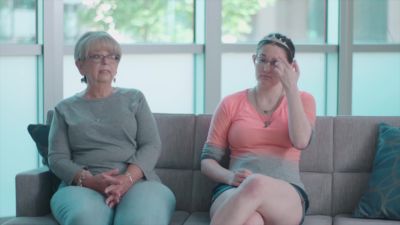Navigating Life After You’re Diagnosed with a Genetic Predisposition to Cancer
Finding out you or your child has a genetic predisposition to cancer may not be the news you want to hear. Predisposition means some people have an increased chance of developing cancer because of a genetic condition.
Sometimes individuals are the first one in the family to have the genetic condition, while other times they inherited it from one or both parents.
Families who hear this news often have a range of reactions to the diagnosis. They may need special support.
“Whenever we meet with a family, we tell them we are here to help,” Gina Nuccio, MS, CGC, a genetic counselor, said. “You don’t have to worry about this by yourself. It’s very important for any family in this situation to find an advocate or a support group. You’ll want somebody around you that gets it.”
Nuccio explained that genetic counselors can help:
- Explain risks
- Help connect other family members with similar conditions
- Connect you with helpful support resources, when needed
Understanding genetic predisposition to cancer
Most childhood cancers aren’t the result of a genetic predisposition. But experts estimate these predispositions are responsible for 5-15% of cancer diagnoses. These conditions could include:
“It’s important to remember that these conditions are rare,” Nuccio said. “So many families need help navigating it.”
Navigating a new normal
Being diagnosed with these conditions can mean that you’ll need more medical care. That includes tests and scans. Which ones – and what types – depend on your diagnosis.
Genetic counselors, mental health counselors, and support groups can help you deal with these extra screenings.
Here’s an example. If your child has a predisposition, you may need help talking with the school about the need for extra absences.
An emotional issue
Nuccio explained that these diagnoses can cause a wide range of emotional reactions.
Some families feel relief. It gives them a sense of control over the situation. Others find they feel fear and anxiety over increased scans – “scanxiety”. They may worry about their child’s future.
“Guilt can be common, too,” Nuccio said. “Some parents feel guilty about passing a genetic trait on to their children.”
Nuccio said that children don’t express anger toward their parents. But some of them do worry about passing it on to their own future children.
The emotions surrounding a genetic predisposition are complex. Nuccio encourages families to connect with a mental health professional. A genetic counselor can sometimes make suggestions in their area.
“Genetic counselors can be great connectors. We know how to connect people with resources,” she said.
If you have questions or find out you may need genetic testing for a cancer predisposition syndrome, you can visit the National Society of Genetic Counselors to find a genetic counselor in your area.






